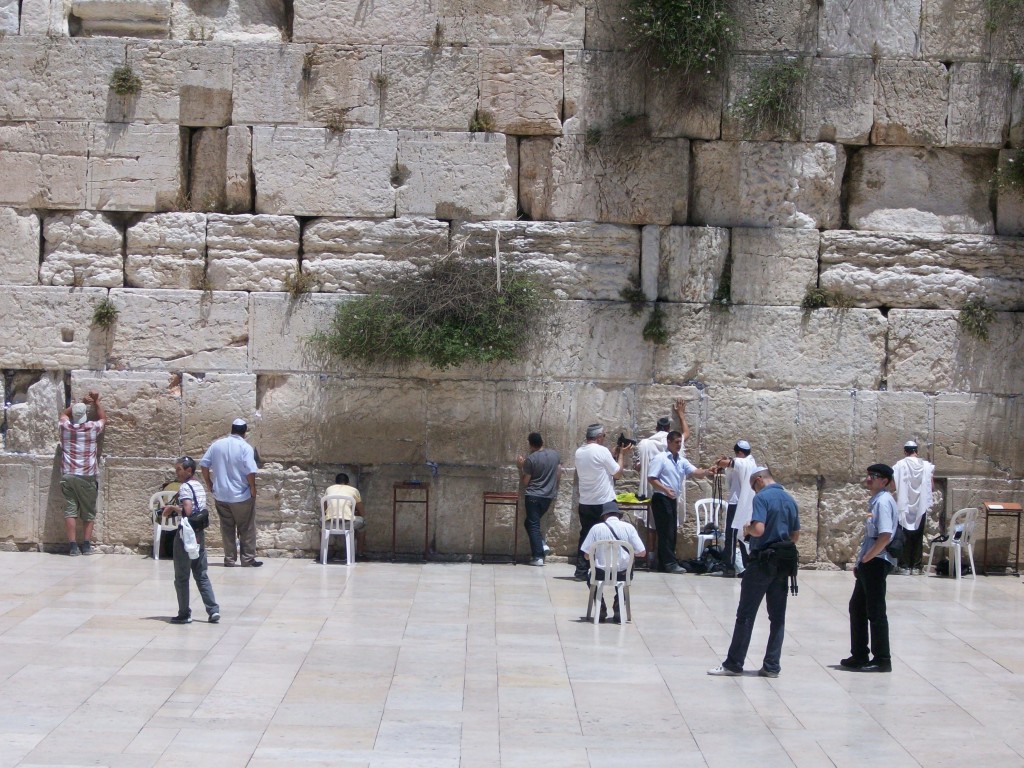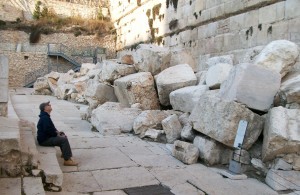On this date in 587 B.C., the temple built by Solomon was destroyed by the Babylonians. On this very same date in 70 A.D., the temple rebuilt on that site was destroyed by the Romans.

On our first visit to Israel in 2009, my husband and I dropped our bags at our Jerusalem hotel. We were exhausted from a long day of travel, but knew we needed to stay awake for a few more hours in order to combat jet lag. We started walking, no particular destination in mind, and soon found ourselves in the Old City. Our little map was useless in deciphering the warren of ancient streets and alleys, so we just wandered. At least, we thought we were just wandering.
Without planning to do so, we found ourselves at the Wall. We’d planned to visit later in our trip, but at the direction of a homing device we couldn’t fully explain, we were drawn there first in our visit. We didn’t need a map to find it.

A few days later, we were touring the area to the south of the Wall, and saw super-sized evidence of the Second Temple’s destruction. Just a few decades before, when the Temple was the centerpiece of worship for their people, Jesus’ disciples marveled at the majesty of the holy place. Just days before he was crucified, he told his disciples, “‘Do you see all these things?’ he asked. ‘Truly I tell you, not one stone here will be left on another; every one will be thrown down.'” (Matthew 24:2)
He was right.
This day, Tisha B’Av (Ninth of Av), has been marked through history with a number of other calamities for the Jewish people. On this date in 1941, for example, Adolph Hitler signed the order greenlighting the Final Solution. More than six million Jews – two-thirds of the Jews in Europe – were killed as a result of this order.
As I watch events unfold in Israel, Gaza and the West Bank, and note with growing concern the rise in anti-Semitic activity and rhetoric, I remember that today is a day when the Book of Lamentations is read in the Jewish community. The grief of those words, written shortly after the First Temple was destroyed, is fresh for every generation of Jewish people. The grief is there for a purpose, tied to a deep longing for wholeness and restoration.
How deserted lies the city, once so full of people! How like a widow is she, who once was great among the nations! She who was queen among the provinces has now become a slave. Bitterly she weeps at night, tears are on her cheeks. Among all her lovers there is no one to comfort her. All her friends have betrayed her; they have become her enemies. – Lamentations 1:1,2
It is the same longing that drew my husband and I to the wall as if a powerful magnet was pulling us there. I remember that longing on this day – and I pray that the longing will lead to revelation of Messiah for the Jewish people, and for all the nations of this earth.
Won’t you join me in that prayer?











